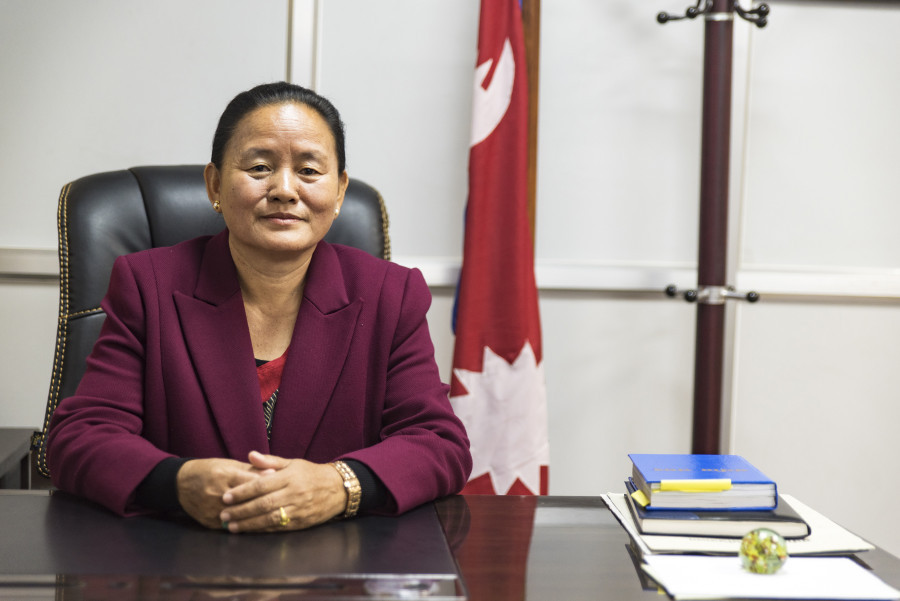National
Government seeks shortcut to get constitution amendment bill passed
The government has said that a quick passage of the bill will allow it time to prepare ground for talks with India, but analysts believe it fears political disruption.
Tika R Pradhan
With the tabling of the second amendment to the constitution, the government appears to be aiming to get the bill endorsed as soon as possible, even if it means suspending parliamentary rules.
Minister for Law, Justice and Parliamentary Affairs Shiva Maya Tumbahangphe tabled the constitution amendment (second amendment) bill at the House of Representatives on Sunday.
A proposal seeking approval to table the amendment bill had been endorsed unanimously by the House earlier on Sunday. The government had registered the bill at the Parliament Secretariat on May 22, seeking to amend Schedule 3 of the constitution to update Nepal’s political map in the national emblem.
The government on May 20 released a new political map depicting Kalapani, Lipulekh and Limpiyadhura within its borders.
“I have talked to the Speaker to expedite the process to ensure that the amendment bill is endorsed at the earliest,” Tumbahangphe told the Post. “The Speaker will hold a meeting of the Business Advisory Committee, which includes the chief whips of all the parties, and take the necessary decisions.”
After the constitution amendment bill is tabled at either of the Houses of the federal parliament, the bill must be published within 30 days, according to Article 274 (3) of the constitution.
The government late Sunday published the bill in the Nepal Gazette.
The bill now will need to be presented to Parliament after a week’s maturity period.
“With the consensus of the parties, the seven-day maturity period could also be shortened by suspending the rule,” said Tumbahangphe.
According to leaders, if the parties agree to take a short-cut, both the Houses and the National Assembly can endorse the bill within a week or so.
Dev Gurung, the ruling party chief whip, said it could take at least three weeks for the amendment bill to pass both the Houses if all the procedures were duly followed.
After the seven-day maturity, the bill will be presented at the House for its consideration. Most bills are forwarded to the concerned parliamentary committees for clause-wise discussions where 72 hours is allocated for lawmakers to register any amendments.
But it is not necessary for this bill to be forwarded to the parliamentary committee and also the 72-hour time for registering necessary amendment could be brought down to one or two hours by suspending the rules—as there would be no one to register amendment.
“With the agreement of the parties, the rules could be suspended to shorten the time so as to expedite the process of the constitution amendment bill,” said Subas Nembang, deputy parliamentary party leader of the ruling Nepal Communist Party (NCP).
Prime Minister KP Sharma Oli had told cross-party leaders during the recent all-party meeting that a quick amendment to the constitution was necessary for allowing the government to prepare the grounds to press its claim in negotiations with India.
Political analysts, however, believe that the government is cognizant of the divisions within the ruling party and is attempting to complete the amendment process before differences emerge.
“The government is afraid that the political situation could change and a power play could take place,” said analyst Geja Sharma Wagle.
But as of now, the parties’ support for the amendment sends a strong message to Nepal’s neighbours that all political forces are united when it comes to issues of national importance, said Wagle.
All the parties might have professed their support for the government’s constitution amendment, but the two Madhes-based parties—Samajbadi Party Nepal and Rastriya Janata Party Nepal—have been attempting to include their own longstanding demands into the amendment bill.
The primary opposition Nepali Congress, at its Central Working Committee meeting on Saturday, decided to table a separate amendment bill by reviving a three-year old proposal filed by party President Sher Bahadur Deuba, Congress Vice-president Bimalendra Nidhi told the Post. When presented in July 2017, the proposal had failed to garner a two-thirds majority, opposed primarily by the CPN-UML, then led by Oli.
Last week, leaders from the two Madhes-based parties met with Deuba and sought support from the Nepali Congress to include their long-standing demands into the government's amendment proposal.
The Congress’ three-point amendment proposal aims to address the demands of the two parties and foster wider acceptance of the 2015 constitution.
The regional parties have long been demanding an amendment to the constitution regarding a host of issues, including citizenship and provincial boundary demarcation.
Anil Giri contributed reporting.




 17.12°C Kathmandu
17.12°C Kathmandu














